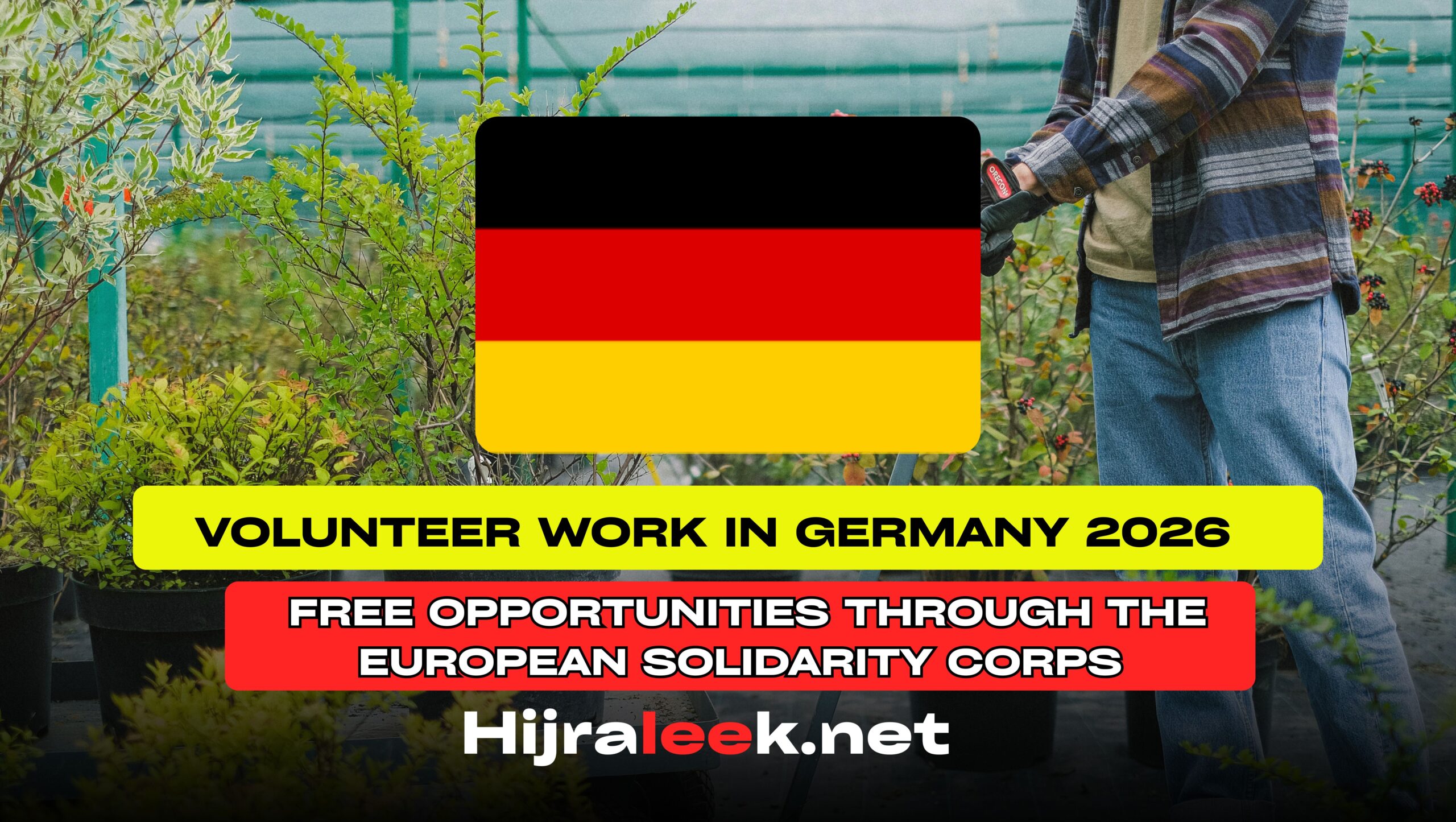The European Solidarity Corps (ESC) is one of the European Union’s flagship programs empowering young people aged 17–30 to engage in meaningful volunteer activities across Europe, fostering skills, intercultural understanding, and community impact. In 2026, Germany—known for its vibrant civil society, environmental initiatives, and social projects—offers a plethora of free volunteer opportunities through ESC, particularly in areas like environmental conservation, social inclusion, and youth engagement. With over 1,000 projects annually in Germany, the program covers all costs (travel, accommodation, food, insurance, and a pocket money allowance), making it truly accessible. This guide explores eligibility, application process, benefits, and tips for securing a spot in 2026, emphasizing how ESC turns volunteering into a transformative experience. For tailored opportunities, platforms like Hijraleek connect aspiring volunteers with ESC-aligned hosts in Germany.
What is the European Solidarity Corps?
The ESC, launched in 2018 and funded by the EU with a €1.009 billion budget for 2021–2027, connects young Europeans (and non-EU participants from partner countries) with volunteering, traineeships, and solidarity projects. In Germany, coordinated by the National Agency under the Deutsches Jugendinstitut (DJI), it supports over 500 projects yearly, focusing on themes like climate action, migration, and digital inclusion. For 2026, ESC aims to mobilize 500,000 young people EU-wide, with Germany expecting 5,000+ participants amid its push for youth involvement in the UN’s Sustainable Development Goals (SDGs). Volunteering is unpaid but fully supported—no fees for participants—lasting 2–12 months, ideal for gap years or career exploration.
Why Volunteer in Germany via ESC in 2026?
Germany’s diverse landscape—from Berlin’s urban activism to Bavarian rural conservation—offers immersive experiences. In 2026, with the EU’s post-2024 recovery focus, ESC projects emphasize green transitions and social cohesion, aligning with Germany’s €100 billion climate fund. Volunteers gain EU-recognized certification (Youthpass), language skills, and networks, often leading to employment (80% of ESC alumni report improved job prospects). Free participation removes barriers, covering €200–€500/month pocket money plus full logistics.
Who Can Participate in ESC Volunteering in Germany?
ESC is open to residents of EU countries or partner nations (e.g., Ukraine, Tunisia, Morocco), with no prior experience required. Key eligibility:
- Age: 17–30 (under 17 with parental consent for some projects).
- Nationality: EU citizens or those from ESC partner countries; non-EU applicants from eligible nations (e.g., India, Brazil) can join via partnerships.
- Skills: None mandatory; enthusiasm for themes like environment or education suffices. German language (A1) helpful but not required—English common.
- Availability: 2 weeks to 12 months; full-time commitment (30–38 hours/week).
- Other: Clean criminal record for child/youth projects; health insurance (provided by ESC).
No costs to apply or participate—ESC funds everything for selected volunteers.
Types of ESC Volunteer Opportunities in Germany 2026
ESC projects in Germany span volunteering (main focus) and traineeships, with 2026 emphasizing hybrid formats post-pandemic. Below are key types, based on 2025 trends expected to continue:
Short-Term Volunteering (2–2 months)
- Focus: Community events, festivals, or emergency response (e.g., flood relief in Saxony).
- Examples: Assisting at Berlin’s youth centers or environmental cleanups in the Black Forest.
- Benefits: Quick immersion; ideal for students.
Long-Term Volunteering (2–12 months)
- Focus: In-depth projects in sustainability, inclusion, or culture.
- Examples:
- Environmental: Organic farming in Brandenburg or reforestation in Thuringia (aligning with Germany’s 2030 climate goals).
- Social: Refugee support in Hamburg or youth mentoring in Munich.
- Cultural: Heritage preservation in Dresden or digital literacy in rural Bavaria.
- Agriculture Tie-In: Projects like community gardens or agroecology initiatives in Mecklenburg-Vorpommern, linking to Germany’s organic farming boom.
Traineeships and Solidarity Projects
- Focus: Professional development or group initiatives.
- Examples: 6-month traineeships in Berlin NGOs for social media or event management; team projects on climate education in Cologne.
- 2026 Trends: Increased emphasis on digital volunteering and hybrid models, with 20% more slots for non-EU participants.
Projects are listed on the ESC portal; Germany hosts 200+ annually, with priority for underrepresented groups (e.g., rural youth).
Application Process for ESC Volunteering in Germany
The process is straightforward and free, with rolling deadlines but peak calls in fall for 2026 starts. Steps:
- Explore Opportunities: Search the ESC database at youth.europa.eu/solidarity or freiwilligesengagement.de for Germany-specific projects. Filter by theme (e.g., environment) and duration.
- Create Profile: Register on the European Youth Portal (youth.europa.eu) with your EU Login (free). Upload CV, motivation letter, and references.
- Select and Apply: Choose 1–3 projects; submit online via the portal. Include a motivation statement (500 words) explaining your interest and skills.
- Interview and Selection: Shortlisted candidates (within 2–4 weeks) attend virtual/in-person interviews with hosts. National Agencies (e.g., DJI in Germany) may assist.
- Agreement and Preparation: If selected, sign a Volunteer Agreement (covers costs, rights). Attend pre-departure training (online, free).
- Arrival: ESC arranges travel; start with orientation. For non-EU, visa support provided (Schengen C/D visa, free via hosts).
Deadlines: Rolling, but apply by October 2025 for summer 2026; EU funding ensures no application fees.
Benefits of Volunteering in Germany via ESC
ESC volunteering is transformative and cost-free:
- Financial: Full coverage of travel (€200–€1,000), accommodation, food (€400–€600/month), insurance, and pocket money (€150–€500/month, tax-free).
- Skills & Certification: Gain soft skills (teamwork, leadership) plus Youthpass (EU-recognized certificate); 90% of participants report career boosts.
- Cultural Immersion: Live with locals, learn German (free courses included), and explore sites like the Rhine Valley or Berlin Wall.
- Sustainability Focus: Many projects align with SDGs, offering experience in green initiatives—key for future jobs in Europe’s €1 trillion green economy.
- Networking: Connect with 500,000+ ESC alumni; hosts often provide references for employment.
For agriculture enthusiasts, projects like farm volunteering in Pomerania build hands-on skills, potentially leading to paid roles.
Challenges and Tips for Success
Common Challenges
- Competition: High demand (500,000 EU-wide slots); popular projects fill quickly.
- Language: Basic German useful; non-speakers may struggle in rural areas.
- Visa for Non-EU: Schengen visa processing (15–30 days); ESC provides support letters.
- Commitment: Full-time involvement; flexibility needed for group projects.
Tips for Securing a Spot
- Apply Early: Monitor youth.europa.eu for new calls; tailor applications to project themes.
- Stand Out: Highlight personal motivations and skills; volunteer locally first for experience.
- Network: Join ESC Facebook groups or contact German National Agency (DJI) for advice.
- Prepare: Learn basic German via Duolingo; research hosts on the portal.
- Leverage Platforms: Use Hijraleek for related paid agricultural roles post-volunteering.
Frequently Asked Questions (FAQs)
1. Is ESC volunteering truly free in Germany?
Yes—ESC covers all costs, including travel, lodging, meals, and insurance. Volunteers get pocket money but no salary.
2. Who can apply for ESC in Germany?
EU residents aged 17–30; non-EU from partner countries (e.g., Ukraine, Morocco) with visa support. No experience required.
3. What are typical ESC projects in Germany?
Environmental cleanups, refugee aid, youth education, and cultural exchanges; agriculture-focused in rural areas like Brandenburg.
4. How long does the application take?
2–4 weeks for selection; start dates flexible from January 2026.
5. Can ESC lead to paid work?
Yes—80% of alumni gain employment; Youthpass aids resumes. Many transition to agriculture or NGO jobs.
6. What if I’m non-EU?
ESC provides visa invitation letters; apply for Schengen visa via German embassy or VFS Global (free processing via program).
7. Are there quotas for 2026?
No strict quotas; 5,000+ spots in Germany, prioritized by project needs.
8. How to contact ESC in Germany?
Email na-germany@dj.de or visit freiwilligesengagement.de.
9. Can I volunteer in agriculture specifically?
Yes—projects include organic farms and community gardens; search “agriculture” on the ESC portal.
10. What if my application is rejected?
Reapply to other projects; seek feedback from hosts or National Agency.
Conclusion
Volunteering in Germany through the European Solidarity Corps in 2026 is a free, impactful way to gain skills, build networks, and immerse in a culture of innovation and community. With full financial support and diverse projects—from Berlin’s urban initiatives to rural farm work—it’s perfect for young adventurers. Start by registering on youth.europa.eu/solidarity and exploring hosts via Hijraleek for complementary opportunities. Embrace the chance to contribute to Europe’s future—your ESC journey awaits!




















